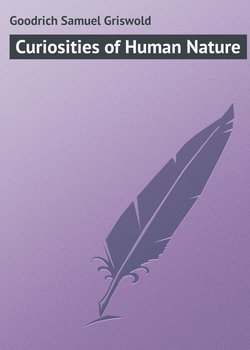Читать книгу Curiosities of Human Nature - Goodrich Samuel Griswold - Страница 2
BARATIERE
ОглавлениеJohn Philip Baratiere was a most extraordinary instance of the early and rapid exertion of mental faculties. He was the son of Francis Baratiere, minister of the French church at Schwoback, near Nuremberg, where he was born, January 10, 1721. The French was his mother tongue, and German was the language of the people around him. His father talked to him in Latin, and with this he became familiar; so that, without knowing the rules of grammar, he, at four years of age, talked French to his mother, Latin to his father, and High Dutch to the servants and neighboring children, without mixing or confounding the respective languages.
About the middle of his fifth year, he acquired a knowledge of the Greek: so that in fifteen months he perfectly understood all the Greek books in the Old and New Testament, which he translated into Latin. When five years and eight months old, he entered upon Hebrew; and in three years more, was so expert in the Hebrew text, that, from a Bible without points, he could give the sense of the original in Latin or French, or translate, extempore, the Latin or French versions into Hebrew. He composed a dictionary of rare and difficult Hebrew words; and about his tenth year, amused himself, for twelve months, with the rabbinical writers.
He now obtained a knowledge of the Chaldaic, Syriac and Arabic; and acquired a taste for divinity and ecclesiastical antiquity, by studying the Greek fathers of the first four ages of the church. In the midst of these occupations, a pair of globes coming into his possession, he could, in eight or ten days, resolve all the problems upon them; and in January, 1735, at the age of fourteen, he devised his project for the discovery of the longitude, which he communicated to the Royal Society of London, and the Royal Academy of Sciences at Berlin!
In June, 1731, he was matriculated in the university of Altorf; and at the close of 1732, he was presented by his father at the meeting of the reformed churches of the circle, at Franconia; who, astonished at his wonderful talents, admitted him to assist in the deliberations of the synod; and, to preserve the memory of so singular an event, it was registered in their acts. In 1734, the Margrave of Brandenburg, Anspach, granted this young scholar a pension of fifty florins; and his father receiving a call to the French church at Stettin, in Pomerania, young Baratiere was, on the journey, admitted master of arts. At Berlin, he was honored with several conversations with the king of Prussia, and was received into the Royal Academy.
Towards the close of his life, he acquired a considerable taste for medals, inscriptions, and antiquities, metaphysical inquiries, and experimental philosophy. He wrote several essays and dissertations; made astronomical remarks and laborious calculations; took great pains towards a history of the heresies of the Anti-Trinitarians, and of the thirty years' war in Germany. His last publication, which appeared in 1740, was on the succession of the bishops of Rome. The final work he engaged in, and for which he had gathered large materials, was Inquiries concerning the Egyptian Antiquities. But the substance of this blazing meteor was now almost exhausted; he was always weak and sickly, and died October 5th, 1740, aged nineteen years, eight months, and sixteen days. Baratiere published eleven different pieces, and left twenty-six manuscripts, on various subjects, the contents of which may be seen in his Life, written by Mr. Formey, professor of philosophy at Berlin.
